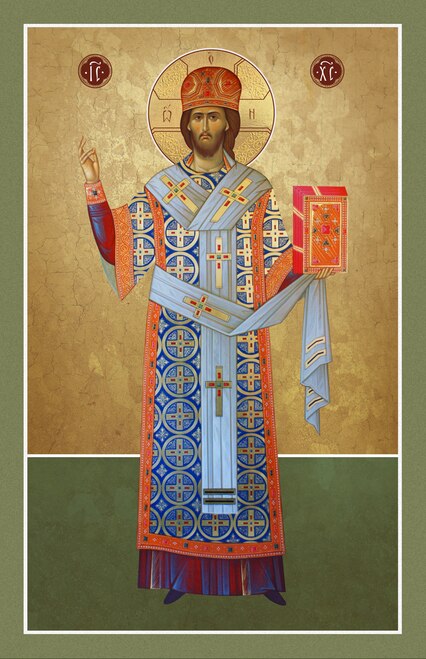In the name of the Father, and of the Son, and of the Holy Spirit, one God, Amen.

“I know what God wants,” I tell myself, “he wants repentance—and I will bring repentance to the world.” And when I see sins, when I see sinners, I point this out. “I am doing the work of the Lord,” I lie to myself, “I am bringing about opportunities for repentance.” And I see a thief at work and I call out the sin, I see a woman caught in adultery and I know what the Law requires (John 8:2–11), I see the Lord blasphemed and I call down a curse from Heaven.
Another, too, knew what God wanted and he went to pray. He was a righteous man, a good man—at least by appearance—and went to pray in the Temple. But his prayer was not to the living God, the Creator of Heaven and Earth, he did not pray to the Most High. The Lord tells us he “prayed … with himself.” For the Pharisee there was no one greater than himself to whom to pray: he was perfect before the Law and utterly blameless, he wanted to remove sin from the entire nation since the pharisees believed the Roman occupation had been brought about by the faithlessness of the Jews.
He knew the Law, but more than that—he not only knew the Law but loved it, it was his heart’s desire. We, in contrast, are called to know the commandments of the Lord but to love him, “Blessed art thou O Lord, teach me thy statutes,” (Psalm 118:12 lxx) we repeat so often in our prayer as the Pharisee should have known, for if we bless God in all things we keep all the prescriptions of the Law.
A tax-collector also came to the temple and the Lord portrays him as the exact opposite of the Pharisee. The Pharisee was outwardly righteous whereas the Publican recognised his own failings, his own sin so that latter’s righteousness far outshone the former’s.
The Church, in her great love for us has given us this Gospel to contemplate as we prepare for the beginning of Lent, the Great Fast, in a few weeks. This is not only a moralistic story—“be like the Tax-collector and not the Pharisee,”—but she is saying to me, “You are the Pharisee.” So easily I excuse sin in my life, so easily I act or fail to act as I know I should, so easily I tell God what he should be doing. I pray for money rather than repentance, for a new job rather than his mercy, for cheap victories rather than the Kingdom. And in return God offers me his very self and I pray for him to be my fairy-godmother, God offers me eternal-life and I ask for a more comfortable earthly existence, God offers divinity himself and I seek corruptible pleasures.
My dear brothers and sisters, Lent, the season of repentance, is nearly upon us. Let us rise to the challenge that we put aside all earthly cares by purifying our souls and bodies, by rejecting our desire to look down upon our neighbours and asking God for repentance, mercy and his Kingdom. And if we do so, if we look upon all others as being above us, the Lord will dwell within us and we will be with him for ever.
To our incarnate, crucified and risen Saviour be all glory, honour and might, together with his Father who is without beginning and the All-holy, Good and Life-giving Spirit. Amen.
Timothy, my son, you have observed my teaching, my conduct, my aim in life, my faith, my patience, my love, my steadfastness, my persecutions, my sufferings, what befell me at Antioch, at lconion, and at Lystra, what persecutions I endured; yet from them all the Lord rescued me. Indeed all who desire to live a godly life in Christ Jesus will be persecuted, while evil men and impostors will go on from bad to worse, deceivers and deceived. But as for you, continue in what you have learned and have firmly believed, knowing from whom you learned it and how from childhood you have been acquainted with the sacred writings which are able to instruct you for salvation through faith in Christ Jesus.
— 2 Timothy 3:10–15
The Lord said this parable, “Two men went up into the temple to pray, one a Pharisee and the other a tax collector. The Pharisee stood and prayed thus with himself, ‘God, I thank you that I am not like other men, extortioners, unjust, adulterers, or even like this tax collector. I fast twice a week, I give tithes of all that I get.’ But the tax collector, standing far off, would not even lift up his eyes to heaven, but beat his breast, saying, ‘God, be merciful to me a sinner!’ I tell you, this man went down to his house justified rather than the other; for everyone who exalts himself will be humbled, but he who humbles himself will be exalted.”
— Luke 18:10–14
